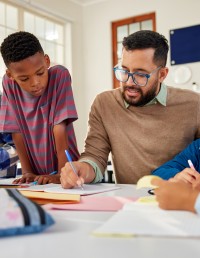Educators call on United Nations to address anti-Black racism
Statements to U.N. Forum focus on ending book bans & other erasures of Black history
Every child deserves to freely learn and feel safe, heard and respected while at school — a space in which honest instruction, growth and exploration should be expected and encouraged. For far too many Black students, however, this reality simply doesn't exist.
Attacks on public education, particularly Black history and its role in American history, have ramped up in recent years, seeking to undermine decades of racial progress in the U.S. These targeted attacks aren't limited to one nation, though, and disproportionately harm Black children across the globe — children who already face deep and enduring inequities in school discipline, academic performance and over-policing.
In an effort to spur much-needed change, the National Center for Youth Law joined with educators and others in addressing the United Nations Permanent Forum on People of African Descent. During the forum, held in May at U.N. Headquarters in New York City, Natasha Wilkins, Education Engagement Manager with the National Center for Youth Law, provided written testimony to the U.N. panel that called on the body to encourage all nations to commit to providing public education free from bans on materials and lessons that erase history and scholarship of and about people of African descent.
"The attack on how history is taught in schools is intentionally designed to prevent an entire generation of children from recognizing how the past continues to shape present inequities," Wilkins wrote in her testimony to the U.N. Forum. "Without this context, the over-policing of Black children in schools and the extreme disparities seen in school discipline and academic performance between Black children and their peers appear to indicate an inherent flaw in the abilities and character of people of African descent, rather than the clear result of sustained systemic oppression."
Addressing systemic racism
The National Center for Youth Law supports the efforts of the U.N. Permanent Forum on People of African Descent to address systemic racism and advance educational outcomes for children of African descent. Continuing to allow the global erasure of Black people from our shared historical narrative only furthers the dehumanization that upholds the ongoing enslavement and murder of Black people across the planet.
Joining Wilkins at the forum were acclaimed educators representing the Voices for Honest Education fellowship, a partnership of the National Center for Youth Law and the National Network of State Teachers of the Year. Specifically, they called on the U.N. panel to:
- Encourage all nations to commit to making schools safe spaces that protect the telling of the full and accurate history of people of African descent in their nation and globally;
- Recommend that nations prioritize developing schools as spaces of inclusion that affirm the value of all students; and
- Draft a declaration that calls on nations to eliminate the banning of books, history and scholarship of and about people of African descent.
"The Universal Declaration of Human Rights states that every child should have access to an education and that education should promote understanding and tolerance among all racial groups," Wilkins wrote. "This can never be achieved where schools, en masse, are used to propagate misinformation and socially and politically 'other' people of African descent."
The National Center for Youth Law is proud to help shape these discussions. The organization also convenes the Education Civil Rights Alliance, a diverse and experienced group of organizers, educator organizations, community groups, professional associations, and civil rights organizations that are committed to protecting the civil rights of marginalized students, especially Black and Brown students.
Read our testimony from the May session of the U.N. Permanent Forum on People of African Descent.
To learn more about anti-Blackness in education read our report and our blog and watch a webinar we hosted in conjunction with the United Nations' forum:






